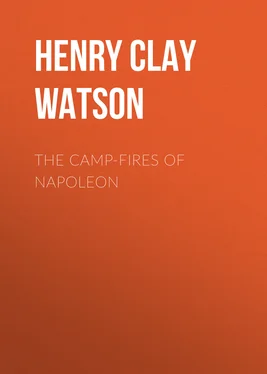Henry Clay Watson - The Camp-fires of Napoleon
Здесь есть возможность читать онлайн «Henry Clay Watson - The Camp-fires of Napoleon» — ознакомительный отрывок электронной книги совершенно бесплатно, а после прочтения отрывка купить полную версию. В некоторых случаях можно слушать аудио, скачать через торрент в формате fb2 и присутствует краткое содержание. Жанр: foreign_prose, foreign_antique, на английском языке. Описание произведения, (предисловие) а так же отзывы посетителей доступны на портале библиотеки ЛибКат.
- Название:The Camp-fires of Napoleon
- Автор:
- Жанр:
- Год:неизвестен
- ISBN:нет данных
- Рейтинг книги:4 / 5. Голосов: 1
-
Избранное:Добавить в избранное
- Отзывы:
-
Ваша оценка:
- 80
- 1
- 2
- 3
- 4
- 5
The Camp-fires of Napoleon: краткое содержание, описание и аннотация
Предлагаем к чтению аннотацию, описание, краткое содержание или предисловие (зависит от того, что написал сам автор книги «The Camp-fires of Napoleon»). Если вы не нашли необходимую информацию о книге — напишите в комментариях, мы постараемся отыскать её.
The Camp-fires of Napoleon — читать онлайн ознакомительный отрывок
Ниже представлен текст книги, разбитый по страницам. Система сохранения места последней прочитанной страницы, позволяет с удобством читать онлайн бесплатно книгу «The Camp-fires of Napoleon», без необходимости каждый раз заново искать на чём Вы остановились. Поставьте закладку, и сможете в любой момент перейти на страницу, на которой закончили чтение.
Интервал:
Закладка:
Around one of the fires in the vicinity of the tent of the commander-in-chief, was sitting a group of officers, among whom Bessieres, Duroc, and Augereau were the only men of renown. All ears were opened listening to Bessieres, who was giving an account of Bonaparte’s wonderful exploit that day, in escaping from a surprise at Lonato. He told the story as follows:
“You know that this morning, our commander-in-chief set off for Lonato at full gallop, to personally hasten the movements of the troops. He was accompanied only by his staff and the Guides under my command. We arrived at Lonato about noon. We found that the orders of the general were already carried out; part of the troops were marching upon Castiglione, and the rest were proceeding towards Salo and Gavardo. About a thousand men remained at Lonato. Scarcely had the general entered the place, when an Austrian flag of truce presented itself, and the bearer summoned him to surrender. The general started at the summons. He could not understand how it was possible that the Austrians could be so close upon him. But the case was soon explained. The division separated in the battle of Lonato, and driven back upon Salo, had been partly captured; but a body of about four thousand five hundred men had been wandering all night in the mountains; and seeing the town almost abandoned, wanted to enter the place, in order to open for itself an outlet upon the Mincio. General Bonaparte had no time to fight a battle, or perhaps he would have done it, even with his force of one thousand men. His plan was formed with his usual quickness and decision. He ordered all the officers about him to mount their horses, and then, the bearer of the flag to be brought before him, with his eyes uncovered; for, as usual on such occasions, the officer was blindfolded. You should have seen the Austrian’s astonishment when he found himself in the presence of our general and his staff. ‘Unhappy man!’ said General Bonaparte, ‘you know not then that you are in the presence of the commander-in-chief, and that he is here with his whole army. Go tell those who sent you, that I give them five minutes to surrender, or I will put them to the sword to punish the insult which they have dared to offer me.’ The astonished bearer of the flag returned with this message to his general. In the meantime, General Bonaparte prepared his small force for action. The Austrian then asked him to propose terms of capitulation. But our general, knowing the importance of immediate action, replied—‘No, you must become at once prisoners of war.’ The Austrian hesitated, but when General Bonaparte ordered his artillery and grenadiers to advance to the attack, the enemy surrendered; and thus, without striking a blow, four thousand infantry and five hundred cavalry surrendered themselves prisoners of war to about one thousand Frenchmen. We gained, besides, two pieces of artillery.”
A general laugh followed this narrative. All agreed that it was an admirable exploit, and quite worthy of the genius of Bonaparte. At this moment, the young commander-in-chief appeared at the door of his tent. His horse was standing near, and he was quickly mounted. “Come, Bessieres and Duroc,” said he in a sharp voice, “we will go over the field.” So saying, he rode away, leaving the officers addressed to follow him as soon as they could. They immediately left the group, which was now joined, however, by Lannes and Berthier, who, wearied out, sought the vacant seats to obtain a short rest.
“Who ever saw the like?” said young Lannes,—he of the tall, stout form, stern countenance, and long, fair hair, parted in the centre. “Such incessant activity! That slender ‘little Corporal’ would tire a host of us. In a few days he has killed five horses with fatigue. He will not entrust any of us with the execution of his important orders. He must see every thing with his own eyes, inquire into every thing, and set every body in a fever of motion by his presence. Such tremendous energy I never knew any other person to possess. I do not believe he sleeps at all. There he goes again, to make his final arrangements for the battle.”
“He will wear himself out too soon, I am afraid,” said Augereau.
“But he will accomplish more in one month than many men could achieve in years. His immortality is already established, and he is but twenty-six,” replied Berthier.
“He will have a glorious opportunity to achieve a decisive victory to-morrow,” said Lannes; “but I doubt whether the battle will be as long and as desperate as that of yesterday.”
“Yesterday was indeed a day of hard fighting, for my division here, at least,” said Augereau. “My troops were completely exhausted, when Liptai’s division was driven from the heights. But how did Junot get cut up in such a way?”
“I’ll tell you,” replied Berthier. “When the Austrian line was broken by the charge of our infantry, one division was driven towards Salo, where Guyeux was posted. General Bonaparte caused it to be pursued, in order to place it between two fires, and General Junot was let loose, with a regiment of cavalry. Junot set off at full speed. He encountered Colonel Bender with a party of his regiment of hussars, whom he charged, with his wonted bravery. But not wishing to waste his time by attacking the rear, Junot made a detour to the right, charged the regiment in front, wounded Colonel Bender and attempted to take him prisoner, when he suddenly found himself surrounded. Of course, he fought like a hero, as he is, and it is said that he killed six of the enemy with his own hand, before he was cut down, and thrown into a ditch. I suppose he will be disabled for some time, which is a real misfortune to the army, as Junot is one of the bravest and most active officers now under General Bonaparte’s command.”
“Yes,” said the generous Lannes, “we shall miss him. He was promoted from the ranks on account of his cool bravery, and he certainly has done honor to the judgment of our general, who first noticed his merit at the siege of Toulon.”
“Still,” said Augereau, “brave men are not scarce in the army of Italy. We shall conquer without Junot, I have no doubt.”
Thus the group continued to converse, until General Bonaparte came up, with Massena and others, and invited them to his tent to receive their final instructions. The quick movements, and rapid, concise speech of the young conqueror indicated the unwearied activity of his mind. He had undergone tremendous exertion, but no trace of it appeared in his bearing. The restless fire of his eye was undimmed; his mind labored as vigorously and with as much precision as if he had been enjoying repose for several days; and the commander of the Guides reported that the general slept but an hour that night.
At the first peep of day, the two armies were in motion. Wurmser, impatient to attack, moved his right along the heights; Bonaparte, to favor this movement, drew back his left, formed by Massena’s division; he kept his centre immovable in the plain. He soon heard Serrurier’s fire. Then, while he continued to draw back his left, and Wurmser to draw out his right, he ordered the redoubt of Medolano to be attacked. At first, he directed twenty pieces of light artillery upon that redoubt, and after briskly cannonading it, he detached General Verdier, with three battalions, to storm it. That brave general advanced, supported by a regiment of cavalry, and took the redoubt. The left flank of the Austrians was thus exposed at the very moment when Serrurier, arriving at Cauriana, excited alarm upon their rear. Wurmser immediately moved part of his second line upon his right, now deprived of support, and placed it en potence to front the French, who were debouching from Medolano. He took the remainder of his second line to the rear, to protect Cauriana, and thus continued to make head against the enemy. But Bonaparte, seizing the opportunity with his accustomed promptness, immediately ceased to avoid engaging his left and his centre, and gave Massena and Augereau the signal which they were impatiently awaiting. Massena with the left, Augereau with the centre, rushed upon the weakened line of the Austrians, and charged it with impetuosity. Attacked so briskly on its entire front, and threatened on its left and its rear, it began to give ground. The ardour of the French increased. Wurmser seeing his army jeopardized then gave the signal for retreat. He was pursued, and some prisoners were taken. To put him completely to the rout, it would have been necessary to make much more haste, and to push him while in disorder upon the Mincio. But for six days the troops had been constantly marching and fighting; they were unable to advance further, and slept on the field of battle. Wurmser had on that day lost no more than two thousand men, but he had nevertheless lost Italy.
Читать дальшеИнтервал:
Закладка:
Похожие книги на «The Camp-fires of Napoleon»
Представляем Вашему вниманию похожие книги на «The Camp-fires of Napoleon» списком для выбора. Мы отобрали схожую по названию и смыслу литературу в надежде предоставить читателям больше вариантов отыскать новые, интересные, ещё непрочитанные произведения.
Обсуждение, отзывы о книге «The Camp-fires of Napoleon» и просто собственные мнения читателей. Оставьте ваши комментарии, напишите, что Вы думаете о произведении, его смысле или главных героях. Укажите что конкретно понравилось, а что нет, и почему Вы так считаете.












